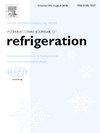Application of vortex generators to avoid subcooled flow boiling oscillation in micro-channel
IF 3.5
2区 工程技术
Q1 ENGINEERING, MECHANICAL
International Journal of Refrigeration-revue Internationale Du Froid
Pub Date : 2024-10-14
DOI:10.1016/j.ijrefrig.2024.10.015
引用次数: 0
Abstract
Subcooled flow boiling in micro-channels is an effective solution for high-heat-flux electronics thermal management, and the heat flux has a limitation value (i.e., limiting oscillation heat flux) due to flow boiling oscillation. The purpose of this study is to propose a new method to suppress the flow boiling oscillation (i.e., forcing bubbles to leave the channel by installing a vortex generator), experimentally verify the effect of vortex generators on suppression of flow boiling oscillation and increasing limiting oscillation heat flux, and develop a predicting correlation for this heat flux. In the experiments, the vortex generator is a helix wire with a pitch of 1.8 mm, a length of 22.5 mm, a wire diameter of 0.2 mm and a diameter of 1.8 mm; the inlet subcooling degree and mass flux range from 10 – 50 K and 750–1750 kg m−2 s−1, respectively. The results show that, the flow boiling oscillation occurs in the flow channel without vortex generators while it doesn't occur in the flow channel containing vortex generators at the same working condition; the vortex generators can raise the limiting oscillation heat flux with a maximum increment of 21.1%, which indicates that vortex generators can suppress the flow boiling oscillation. A new correlation predicting limiting oscillation heat flux in channels with vortex generators was developed, and its predictions match 95% of the experimental data within ± 20% while the average deviation is 7.6%.
应用涡流发生器避免微通道中的过冷流沸腾振荡
微通道中的过冷流动沸腾是高热流量电子器件热管理的有效解决方案,由于流动沸腾振荡,热通量有一个限制值(即限制振荡热通量)。本研究的目的是提出一种抑制流动沸腾振荡的新方法(即通过安装漩涡发生器迫使气泡离开通道),通过实验验证漩涡发生器对抑制流动沸腾振荡和提高极限振荡热通量的效果,并建立该热通量的预测相关性。在实验中,涡流发生器为螺旋线,间距为 1.8 mm,长度为 22.5 mm,线径为 0.2 mm,直径为 1.8 mm;入口过冷度和质量通量范围分别为 10 - 50 K 和 750 - 1750 kg m-2 s-1。结果表明,在相同工况下,不含涡流发生器的流道会出现流动沸腾振荡,而含涡流发生器的流道则不会出现;涡流发生器能使极限振荡热通量最大提高 21.1%,这表明涡流发生器能抑制流动沸腾振荡。建立了预测带有涡流发生器的通道中极限振荡热通量的新相关性,其预测结果与 95% 的实验数据吻合,误差在 ± 20% 以内,平均偏差为 7.6%。
本文章由计算机程序翻译,如有差异,请以英文原文为准。
求助全文
约1分钟内获得全文
求助全文
来源期刊
CiteScore
7.30
自引率
12.80%
发文量
363
审稿时长
3.7 months
期刊介绍:
The International Journal of Refrigeration is published for the International Institute of Refrigeration (IIR) by Elsevier. It is essential reading for all those wishing to keep abreast of research and industrial news in refrigeration, air conditioning and associated fields. This is particularly important in these times of rapid introduction of alternative refrigerants and the emergence of new technology. The journal has published special issues on alternative refrigerants and novel topics in the field of boiling, condensation, heat pumps, food refrigeration, carbon dioxide, ammonia, hydrocarbons, magnetic refrigeration at room temperature, sorptive cooling, phase change materials and slurries, ejector technology, compressors, and solar cooling.
As well as original research papers the International Journal of Refrigeration also includes review articles, papers presented at IIR conferences, short reports and letters describing preliminary results and experimental details, and letters to the Editor on recent areas of discussion and controversy. Other features include forthcoming events, conference reports and book reviews.
Papers are published in either English or French with the IIR news section in both languages.

 求助内容:
求助内容: 应助结果提醒方式:
应助结果提醒方式:


